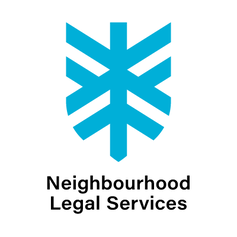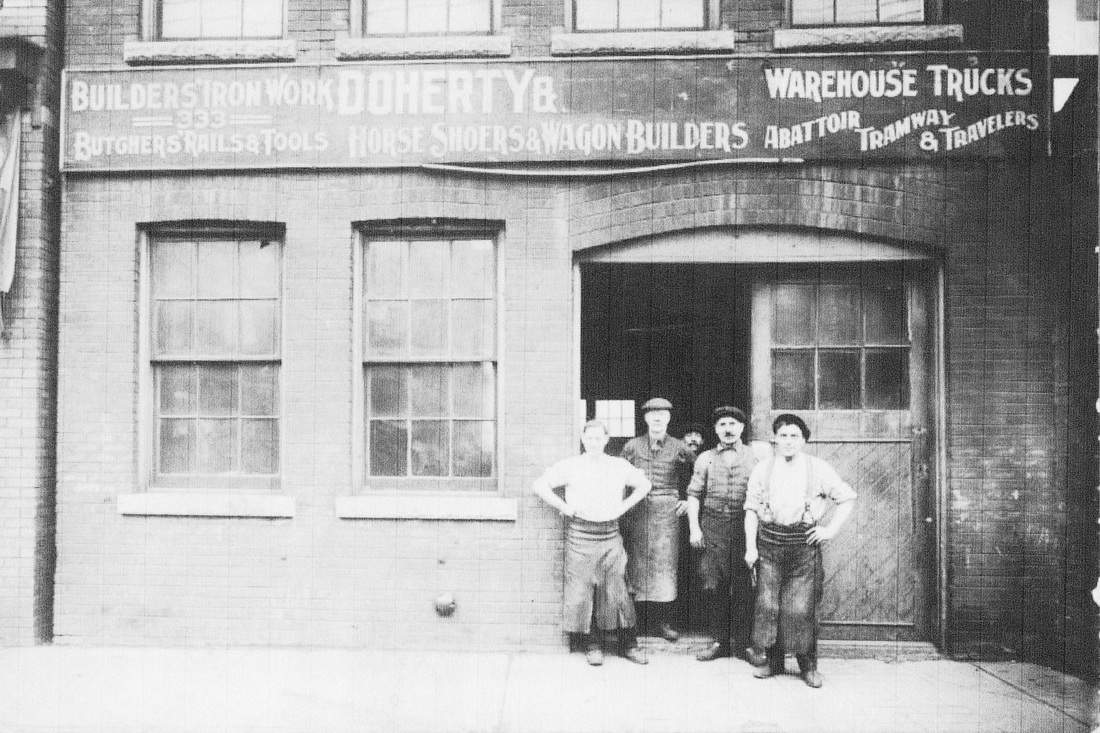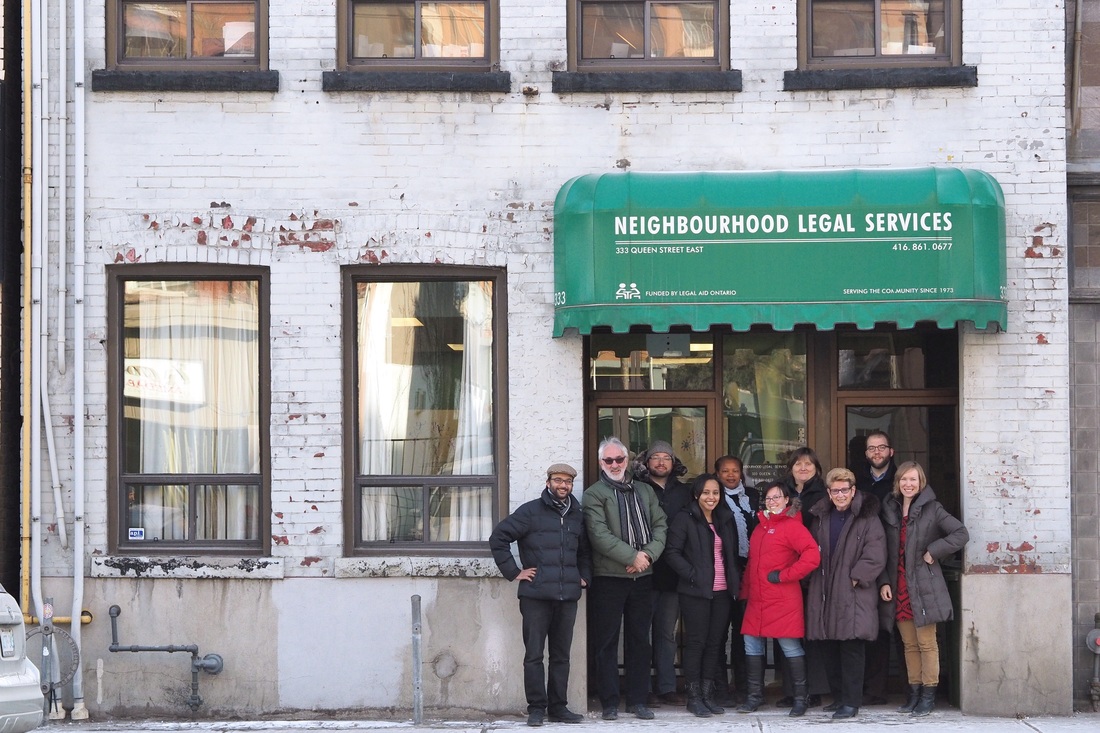our historyNeighbourhood Legal Service has been serving the community since 1973. As one of the first community legal clinics in Ontario, NLS has a long and proud history within the clinic movement and in being a leader in delivering poverty law services.
In celebration of our 40th Anniversary, we have developed this page to provide an overview of NLS's history since its inception in 1971 to present day. Our idea is to treat this page as a living archive that will be supplemented and edited both as we continue to progress and grow, and as we turn up interesting tidbits in our paper archives, or receive further historical information from others. If you have any documents, stories or photographs about NLS that you would like to share, please feel free to contact us. In the Beginning... The idea of NLS dates back to the winter of 1971 – 72, when several law students at Osgoode Hall Law School decided to establish a community run neighbourhood law office along the lines of the Service Juridique Communitaire, a community run law office in Pointe St. Charles, Montreal. Based on favourable contacts with Cabbagetown community groups, a successful application was made for Opportunities for Youth funding in the spring of 1972. A feasibility study followed, carried out by law students and others, including invaluable assistance provided by community organizer Jennifer Silcox. The study confirmed the need for a community law office to serve the needs of poor people. NLS’s embryonic structure was on the first funding application, including the belief that lower income people have an "undisputed right to good, competent legal services to be used in the exercise of their rights under the law", the use of trained non-lawyers for tasks that did not necessarily require a lawyer's skills and priveleges, and an elected community Board of Directors. It was expected that the office would handle individual cases but that the primary thrust would be placed on community education and test case litigation in the areas of welfare, housing, family and consumer law. In spite of the considerable efforts on the part of this initial group, funding was not forthcoming. NLS would not be serving the community since 1972. Phase two: Starting to Serve the Community, and the Search for Funding
During the spring of 1973, a young lawyer named Allan McChesney established his own contacts with community people and groups with the aim of establishing a community law office. Barry Morris, a United Church minister and organizer for the Christian Resource Centre, was instrumental in strengthening the contacts. The contacts coalesced into a group of community members who went on to become NLS's Board of Directors. It included several resource people, including some such as Jennifer Silcox, Irwin Schwartz and Michelle Swenarchuk who were part of the original project in 1972. During the fall of 1973, the organization was incorporated under the name Don District Training Program (under which is still legally operates), and received a charitable donation number. However, the contact group continued to refer to it as Neighbourhood Legal Services in anticipation of the day when an office would be opened. The search for funding began again in earnest that same Fall with applications to public and private sources. In the mean time, the Board decided that it was time to begin to respond to the need for the community education. In 1973 NLS began to serve the community on a voluntary basis. Volunteers taught a general law course at Oak Street Community School (Regent Park) as part of the night school curriculum (Fall and Winter, 1973-74). The Board also presented a brief to the Osler Task Force on Legal Aid outlining deficiencies in the present Legal Aid Plan and recommending the use of Community Law Offices staffed with lawyers and community legal workers as a complement to the existing Plan. The (by now discouraging) search for funding continued into 1974. The Board’s perseverance paid off; NLS received temporary funding from the Secretary of State (Canada) through the Christian Resource Centre for two full time workers to work with rooming house residents. Phase three: NLS’s First Project One of the Board members, Phoebe Graham who had had previous organizational and administrative experience at Operation Family Rights, agreed to co-ordinate the Roomers' Rights summer project. Two staff people were hired and began working with South of Jamestown roomers, particularly those on Wellesley and Ontario Streets. They made several presentations to the City of Toronto documenting the awful conditions in some rooming houses, with NLS advocating for roomers to be afforded all the protections of tenants in Ontario (something NLS and our allies were eventually successful in achieving). The work with roomers was continued at the end of the summer by volunteer staff, as was NLS’s advocacy to the City. These early activities confirmed the Board’s belief that tackling problems faced by lower income people required going beyond traditional community education and legal work, and included community organization and advocacy. Meanwhile the search for funding continued. During 1974, the United Church provided funds which permitted the preparation and instruction of a ten (10) week course in general law for downtown clergy. The Flavelle Foundation of Toronto also granted NLS funds which, along with the remainder of the United Church grant, was used as "seed", money to provide basic facilities for the establishment of a stable community the law office. During the winter of 1974-75, an Advisory Board of interested professionals were constituted. Members included lawyers, two doctors, and an accountant who were prepared to offer professional advice on particular issues. Phase four: NLS Opens its Doors In 1975, NLS received nine months funding from the federal Department of Justice. Allan McChesney was hired as the legal director. Steve Oltuski, Nancy Peterson, Ted Strange and Jo-Ann Stidman were NLS’s first full-time staff members. NLS officially opened its doors as a law office on April 1, 1975. The Board decided three core practice areas: welfare, unemployment insurance, and housing. Traditionally lower income people had been unable to obtain competent legal services in these areas. In addition to providing legal services on discrete cases, NLS continued to work with a number of other community groups, including the Federation of Limited Dividend Tenants, Federation of Metro Tenants, Prisoner's Rights Group, Mayor's Task Force on Tenants, South of Carlton Community Association (S.O.C.C.A.), Action on Legal Aid (A.L.A.) and several ad hoc tenants' groups. Demonstrating its leadership early on, NLS parented two organizations in 1975 - Roomers' Rights, and Welfare Information Services. These organizations received independent though temporary funding from Secretary of State and Opportunities for Youth respectively. Roomers' Rights was a continuation of previous work with roomers, whereas Welfare Information Services eventually lost its independent funding and its work folded back into NLS. By 1976, highlights of NLS’s community educations efforts in this period included regular seminars held in the Don Jail for 16 to 18 years old first-time offenders, and at schools such as the Contact Community School (for bright drop-outs from the local community). LIP funding in 1975 allowed NLS to expand these efforts and provide training in specific areas of law for community groups. In addition, volunteers prepared legal columns for the community newspaper, Seven News. NLS continued to improve and expand its services, attracting volunteers to help in all phases of work including typing (back in the day!), telephone reception, column writing, and providing legal and referral advice to staff and clients. Against all odds, NLS had become an operational reality and an invaluable part of the community. Phase 5: Becoming a Part of Legal Aid The Government of Ontario had passed the Legal Aid Act in 1966, which created the Ontario Legal Aid Plan (OLAP). OLAP’s overall mandate was to provide necessary legal services to low income people. The 1974 Report of the Task Force on Legal Aid – the Osler Report that the embryonic NLS had made submissions to in 1973 – recommended expanding OLAP by funding community legal aid clinics. This funding was effected by Regulations under the Legal Aid Act in 1976. This Regulation funded NLS and 12 other legal clinics collectively to the tune of $950,000. The funding was meant to enable NLS and others to provide legal services that were most needed by lower income persons and were not readily available through the private bar. NLS had begun with the simple idea that lower income people have an "undisputed right to good, competent legal services to be used in the exercise of their rights under the law". OLAP funding enabled NLS to realize this ideal, allowing NLS to offer a similar scope of services to private law firms. NLS was able to offer services in variety of areas of law, including housing, social assistance, employment and immigration. In addition, NLS continued its community education and organizing activities in partnership with other community groups. The dynamism that NLS and other community legal aid clinics brought to the legal aid system quickly led to the realization that the original Legal Aid Act Regulation was no longer meeting the requirements of the clinic delivery system. Thus a second funding Regulation was passed in 1979 following the Report of the Commission on Clinical Funding (the Grange Report). This provided OLAP authority to fund independent community organizations governed by their own Boards of Directors. NLS began receiving core funding from OLAP as one such leading community organization. In a relatively short span of time NLS had managed to grow from a volunteer community contact group to an independent legal aid organization with its own core funding. This situation continued into the 1990s, with NLS providing high-quality legal services in several areas of law based on community needs, and undertaking a number of community outreach and law reform projects. Phase 6: Inspiring the Next Generation of Legal Aid and Community Legal Clinics The Ontario Legal Aid Review (the McCamus Review) came in 1997. It undertook a comprehensive review of the legal aid system in Ontario. It recommended setting up a new independent agency to run the legal aid system in Ontario. It also looked at the community legal clinic model and “poverty law” services presented by NLS and other similar bodies. The McCamus Review also vindicated the belief, commitment and vision demonstrated by those involved in founding NLS by acknowledging the community legal clinic model pioneered in part by NLS as the best method of providing poverty law services. The current Legal Aid Services Act grew out of this Review. The Act established Legal Aid Ontario (LAO). It also recognized poverty (or clinic) law as an area of legal aid practice, acknowledged that community based clinics are the best method of providing clinic law services, acknowledged the independence of the Boards of Directors to manage local clinics, and accepted the role of local clinics to determine the needs of their community and provide services to meet those needs. Today, there are seventy legal aid clinics throughout Ontario providing community legal services on a province-wide basis. These include community legal clinics such as NLS that work with a particular geographic community, and specialty legal clinics. The latter include clinics that specialize in particular areas of law, such as the Injured Workers Consultants, or the Advocacy Centre for Tenants Ontario. They also include clinics that specialize in serving a particular vulnerable and/or ethno-linguistic client base, such as the Centre for Spanish Speaking Peoples, the Advocacy Centre for the Elderly, the HIV & Aids Legal Clinic of Ontario, or Aboriginal Legal Services. Phase 7: Here today, and looking to the Future With core funding and a stable governance structure enshrined in legislation, NLS continued to provide high quality legal services for the remainder of the 1990s and into the 21st century in several core areas of law. However, the innovative spirit that had first informed NLS's commitment to the community in 1973 continued to drive us forward. In 2002 NLS received special funding from LAO to run Outreach Legal Services (OLS), a project aimed at providing legal services to homeless individuals. Research had shown that homeless persons often do not see many of the problems they face as discrete legal problems, and that they are often uncomfortable in seeking legal assistance in institutional settings such as a law office. Thus OLS was designed to provide legal services on the terms of homeless individuals, by having legal workers attend at shelters and drop-ins. OLS was housed and managed by NLS, and staffed by Yukimi Henry, a brilliant young criminal lawyer, Anita Barnes, an experienced mental health worker who took on the daunting position of the project's Community Legal Worker (a role she reprised when she prodigally returned to NLS a few years later), and Terry Creamer, a social worker. OLS met with great accolades from the media, LAO and other social justice advocates. Its greatest success, of course, was to not only provide services to and to empower a population whose legal needs had long been ignored, but to prove that with commitment and innovation such service delivery was entirely possible. Despite its high-profile success, funding for the project was unfortunately discontinued after 2004. However, the in expansion in office space and infrastructure that the OLS project funded has continued to allow NLS to pioneer other projects and service delivery models. Since OLS, NLS has been able to utilize the extra space to take in articling students, graduate placements and other volunteers. It has also housed private bar lawyers working in complimentary areas of law, as well as several social service agencies, including Sound Times and the Toronto Rent Bank. NLS's next project was in the area of disability appeals. In 2009, NLS applied for and received project funding to hire a dedicated lawyer to conduct Ontario Disability Support Program (ODSP) appeals before the Social Benefits Tribunal. With Saira Cassim, a former NLS articling student, staffing the project, NLS developed unique software that allowed her to track her work and to quantitatively compare it to work done in the area by private lawyers on Legal Aid Certificates. The project again showed that such work could be performed far more efficiently within a community clinic model. Despite having exceeded all its indicators of success, additional funding for the project was not forthcoming. Needless to say, NLS's proposals to expand funding was denied, even though a statistical analysis of the project conclusively showed that it would be cheaper to operate than the legal certificate model. Sadly, since then the metrics have changed, with nearly all funding for Legal Aid Certificates for ODSP appeals having been withdrawn. In this period, NLS also began to consider other ways to meet an apparently endless demand for legal services in an environment of austerity and cuts to funding for legal and social services. This deliberation moved NLS into the present phase of radically rethinking the way legal clinics operate while preserving the core strengths of a community driven model. Phase 8: Transform & Roll Out!
NLS Board and staff and our friends in the community, are as committed as ever to ensuring that legal aid services continue to be available to those in our community who need them. We also understand that changing professional standards, administrative responsibilities to funders, electronic communication possibilities, the increased complexity we all face in our lives, and the increased cost of all that we need and do, make smaller organizations like community legal clinics less viable. Moreover the dramatic demographic change we have seen in the GTA in the past 40 years requires that the resources available for community legal aid services be re-aligned. Along with our colleagues in the other community legal clinics in the GTA, NLS is engaged in an analysis of how we can change to better position ourselves in the current environment. In January 2013, we received a report that recommended clinics be larger and redefine their catchment areas to be more in line with contemporary population patterns. By June 2013, 16 of 17 GTA clinics had agreed to participate in exploring the options laid out in the report, and, with funding from Legal Aid Ontario, we hired consultants to help with the process. The GTA Clinic Transformation Project has now gathered demographic data, information on community needs through interviews with key stakeholders and consolidating information on the work that clinics have been doing. The Project’s Steering Committee, made up of representatives of all the participating clinics, is directing the work. NLS Director of Legal Services Jack de Klerk is the Co-Lead on the project, along with Marjorie Hiley, the Executive Director of Flemingdon Community Legal Services. We are expecting a report from the consultants and the Steering Committee by early summer in 2014. It will recommend among other things how clinics should be realigned, including how many clinics there should be. Then it will be decision time; time to decide how to proceed. For more information please visit: www.gtaclinics.ca. As we recall our history, we recall that NLS and the community legal clinic movement has its genesis in organizing and innovating to provide access to justice and the best possible legal services to lower income communities. A core element of the GTA Clinic Transformation Project is that it is clinic-driven. As such, NLS views it as the next chapter in the struggle to realize the ideals of the community legal clinic movement in the 21st century. And with the support of our community Board of Directors, staff, volunteers, and our friends and supporters, the struggle continues. "Human progress is neither automatic nor inevitable... Every step toward the goal of justice requires sacrifice, suffering, and struggle; the tireless exertions and passionate concern of dedicated individuals." - Martin Luther King Jr. |
Powered by
 Create your own unique website with customizable templates.
Create your own unique website with customizable templates.
 Create your own unique website with customizable templates.
Create your own unique website with customizable templates.



